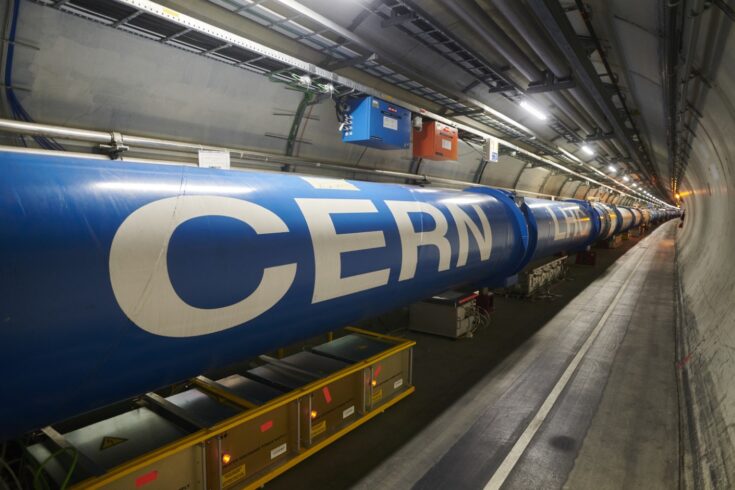The ‘UK Strategy for Engagement with CERN’ was announced on 4 October 2023, by the Secretary of State for Science, Innovation and Technology. It was jointly developed by the Science and Technology Facilities Council (STFC) and the Department for Science, Innovation and Technology (DSIT).
It will act as a comprehensive roadmap to ensure continued success of UK involvement in CERN as well as to pioneer scientific discovery and inspire future generations.
A comprehensive approach
The strategy recognises that although the UK plays a prominent role in many aspects of CERN, there is potential to boost return on the UK’s substantial investment in this world leading facility.
It proposes an approach focused on five goals which are central to UK science ambitions:
- research excellence
- world class skills
- commercial impact and innovation
- international leadership
- engage and inspire
It emphasises the importance of close collaboration with CERN as well as the UK CERN and science and innovation communities to achieve these goals and ensure the strategy’s success as it is implemented over the next decade.
Science superpower ambitions
Professor Mark Thomson, Executive Chair of STFC and UK Research and Innovation (UKRI) Champion for Infrastructure, said:
CERN addresses the most basic questions about the nature of Universe, through some of the most ambitious scientific projects ever conceived, including the Large Hadron Collider.
This pursuit of basic knowledge continually pushes the boundaries of technology, often finding surprising applications in innovative solutions to real-world problems. A strong role for the UK in CERN is an essential component of achieving the Government’s ambitions to be a science superpower on the global stage, working on the most advanced technologies.
The UK has been a key player in CERN since its inception. With the publication of this Strategic Framework, we have reaffirmed our ambition to drive future scientific and technological progress at CERN, collaborating closely with our international partners. In doing so, we will increase the benefits of CERN membership to the UK, through enhanced participation of UK industry in cutting-edge projects at CERN and ever more opportunities for UK engineers and scientists to develop their skills at the forefront of science and technology.
A history of achievement
The UK’s subscription to CERN, totalling approximately £160 million annually, supports the construction and operation of CERN facilities and provides UK scientists and technical staff with a range of opportunities provided by CERN.
This investment has already demonstrated substantial long-term economic and societal benefits for example, as a result of the large number of commercial contracts awarded to UK businesses by CERN.
It has also helped make scientific and technological breakthroughs such as the invention of the World Wide Web and discovery of the Higgs boson possible. In doing so, it improved lives globally and fundamentally changed our understanding of our Universe.
Growth, jobs, and discoveries
George Freeman, Minister of State for Science, Research, and Innovation, in the Ministerial foreword for the strategy says:
As the second largest contributor to CERN, our return on investment is below where we would like it to be, with much more we can still do to ensure we take full advantage of all opportunities that are afforded by CERN membership.
This will allow us to continue being a key member and critical friend at CERN and to unlock the full potential our membership. This paper sets out our strategy to maximise the benefits of our membership of CERN.
Steps for improvement
Several of the actions identified to implement the strategy are already underway such as increasing investment in early career researchers and enhancing coordination across UKRI and government.
Other actions include work in partnership with the UKRI and STFC apprenticeship and placements teams to encourage and support applications to the breadth of placements offered both at CERN and within UK based research facilities.
STFC and DSIT will continually monitor progress against the goals set out in the strategy to ensure that the UK is:
- strengthening its engagement with CERN
- maximising the mutual benefits and impact of its investment for both CERN and the UK
You can read the full strategy on the GOV.UK Science and Innovation website.
Further information
About UK involvement in CERN
Founded in 1954, the CERN laboratory sits astride the French-Swiss border near Geneva. It was one of Europe’s first joint ventures and now has 23 member states, which include the UK.
Physicists and engineers at CERN use the world’s largest and most complex scientific instruments to study the basic constituents of matter, fundamental particles.
Subatomic particles are made to collide together at close to the speed of light. The process gives us clues about how the particles interact and provides insights into the fundamental laws of nature. We want to advance the boundaries of human knowledge by delving into the smallest building blocks of our universe.
Find out more about CERN.
The UK is the second largest contributor to the CERN budget.
The UK subscription to CERN is around £160 million per year. This fee is calculated annually and supports the construction and operation of CERN facilities. Additional funding to UK researchers working on CERN experiments is around £20 to 30 million per year.
Over the course of its membership, there have been two British Director Generals and many major leadership roles in CERN’s prestigious scientific experiments. UK scientists have contributed to Nobel Prize winning results at CERN, most notably in 2013 for the discovery of the Higgs boson.
The UK has played a central role in developing novel technologies for the current and next generation of CERN experiments, particularly at the LHC. It is also taking a leading role in exploiting innovative solutions developed at CERN.
The UK is championing important matters at CERN including environmental sustainability, transparent and robust governance, and diversity and inclusivity.
Find out more about UK involvement in CERN.
Top image: A chain of Large Hadron Collider dipole magnets inside the tunnel at point one (ATLAS) at CERN. Credit: CERN, Samuel Joseph Hertzog

